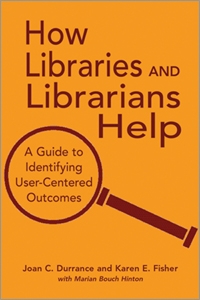Primary tabs
You don't need to be an ALA Member to purchase from the ALA Store, but you'll be asked to create an online account/profile during the checkout to proceed. This Web Account is for both Members and non-Members.
If you are Tax-Exempt, please verify that your account is currently set up as exempt before placing your order, as our new fulfillment center will need current documentation. Learn how to verify here.
- Description
- About the authors
Being able to "tell your library's story," illustrating how library services provide value and help the community and users, is the key to your library's future. The practice of measuring outcomes is becoming crucial to the library's ongoing mission: libraries are being called upon to address the value of library programs by assessing their effects on library patrons and the community as a whole.
With funding under a National Leadership Grant from the Institute of Museum and Library Services (IMLS), Durrance and Fisher have developed the "How Libraries and Librarians Help (HLLH) Outcome Model," field testing it in six libraries over two years. In this practical reference, they share their findings, cutting-edge, step-by-step HLLH methods, and library success stories that bring the process to life with outcomes like, "Empowering Youth" and "Strengthening Community."
Use this straightforward model to:
- Strategize the big picture, collect, and interpret data with seven easy exercises
- Apply the four-step process to assess and present outcomes
- Measure and report your library's contributions
- Draw together all the pieces to communicate a compelling case for library services
To stay in the game, library directors, administrators, managers, and community leaders must prove the value of the library and its services using outcome measures. Here's how to quantify the contribution of your library's programs to individuals and communities to gain recognition and funding.
Joan C. Durrance
Joan C. Durrance is Professor and Coordinator in the School of Information at the University of Michigan, Ann Arbor. A leading authority on community information research, she is also the author of several books including Meeting Community Needs through Job and Career Centers and Armed for Action. She received ALA's Isadore Gilbert Mudge-R.R. Bowker Award for distinguished contribution to reference librarianship. Durrance earned her master's degree in library science from the University of North Carolina and her doctorate from the University of Michigan.
Karen E. Fisher
Karen E. Fisher is an Associate Professor and Chair of the MLIS program at The Information School, University of Washington. She holds a Ph.D. in library and information science from the University of Western Ontario. Her research addresses information behavior in everyday contexts (IBEC). The author of over fifty articles and books, her current research is funded by the Institute of Museum and Library Services, and the National Science Foundation. For more information about Dr. Fisher, visit ibec.ischool.washington.edu.



